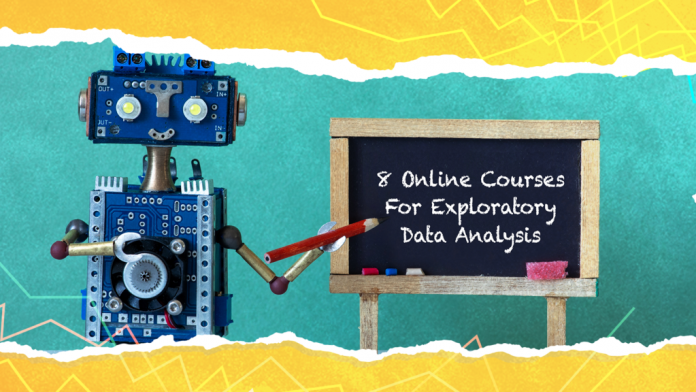Exploratory data analysis or EDA is a method deployed by data scientists to analyse and investigate data sets, and summarise their main characteristics, often employing data visualisation methods.
Exploratory data analysis allows the effective manipulation of data sources, assisting data scientists in checking assumptions and hypotheses and discovering data patterns.
Today, we list the top online exploratory data analysis courses available:
Offered by the Association of Data Scientists, this workshop is meant for learners who want to master data analytics– from the basics to advanced level. On completion of this workshop, one will have an in-depth understanding of data analysis techniques and of the different analysis methods; and will acquire hands-on experience in statistical analysis of data and data visualisation using Python.
The full-day workshop will be addressed by Vaibhav Kumar. The prerequisites of taking this course include knowledge of Python and statistics, and some familiarity with Jupyter/Colab Notebooks.
For more information, click here.
Offered by R-tutorials training, this course teaches one to use R to understand and analyse new data and start their data analysis projects. On completion of this course, one will identify R libraries for data exploration, prepare data for exploration, work with variable types and use time series data.
The course consists of three sections divided into 63 lectures and takes about seven hours to complete. The prerequisites for this course are basic R programming skills and a general understanding of statistics and data visualisation.
For more information, click here.
Offered by Harvard University, this course covers the basics of exploratory data analysis and data visualisation. By taking this course instructed by Rafael Irizarry, one will learn about data visualisation principles, communicating data-driven findings, using ggplot2 to create custom plots, and about the weaknesses of widely-used plots.
The prerequisites for taking this course includes an up-to-date browser to enable programming directly in a browser-based interface. It approximately takes eight weeks to complete the course.
For more information, click here.
Offered by Facebook, on taking this intermediate level course on exploratory data analysis, learners will:
The course is delivered through instructional videos and is taught by Moira Burke, Chris Saden, Solomon Messing and Dean Eckles. The prerequisites for taking this course includes a background in statistics and familiarity with CS and Math topics.
For more information, click here.
Offered by MathWorks, this beginner-level course teaches loading data into MATLAB, preparing it for analysis, visualising it, performing basic computations and communicating results. The course is taught by Erin Byrne, Michael Reardon, Maria Gavilan-Alfonso, Brandon Armstrong, Nikola Trica, Cris LaPierre, Adam Filion, and Heather Gorr.
The course is divided into five modules:
It approximately takes 19-hours to complete this course.
For more information, click here.
This Udemy course is for beginners and teaches the basics of exploratory data analysis– multicollinearity, identifying the relationship between variables, transforming continuous data, central tendency vs dispersion, identifying outliers, and transforming categorical data, among others. In addition, this course covers the techniques and approaches in exploratory data analysis, helping one derive maximum value from the data.
The prerequisites include understanding Python and the basics of machine learning. It is meant for data scientists, Python programmers, ML practitioners, IT Managers, and beginners in machine learning.
For more information, click here.
This course, taught by Allen Downey– Professor at Olin College, presents tools to learners that one needs to clean and validate data, visualise distributions and relationships between two variables, and use regression models to predict and explain. Learners will get to use StatsModels for regression, Pandas, Matplotlib for visualisation, and Python libraries NumPy and SciPy.
By taking this course, one will learn how to explore, visualise and extract insights from data. The course consists of 16 videos and 52 exercises and takes about four hours to complete.
For more information, click here.
Available on Great Learning, this beginner-level course includes:
By taking this course, one will learn uncovering patterns and insights, the basics of exploratory data analysis, using them in R and visualisation using R packages. The course consists of one hour of video content and one quiz. The prerequisites include having the basic knowledge of R.
For more information, click here.
Stay Connected with a larger ecosystem of data science and ML Professionals
Discover special offers, top stories, upcoming events, and more.
Stay up to date with our latest news, receive exclusive deals, and more.
© Analytics India Magazine Pvt Ltd 2021






